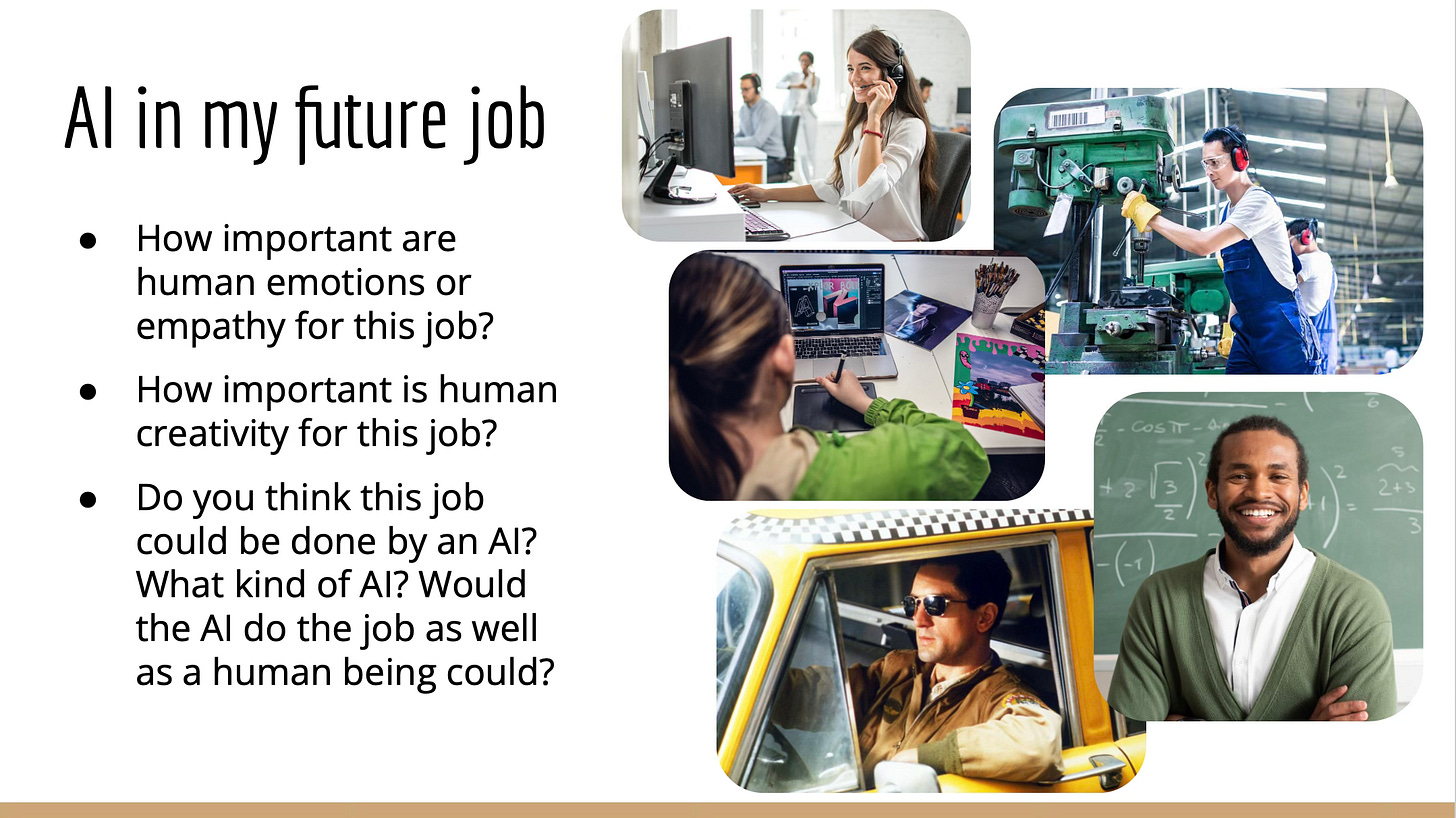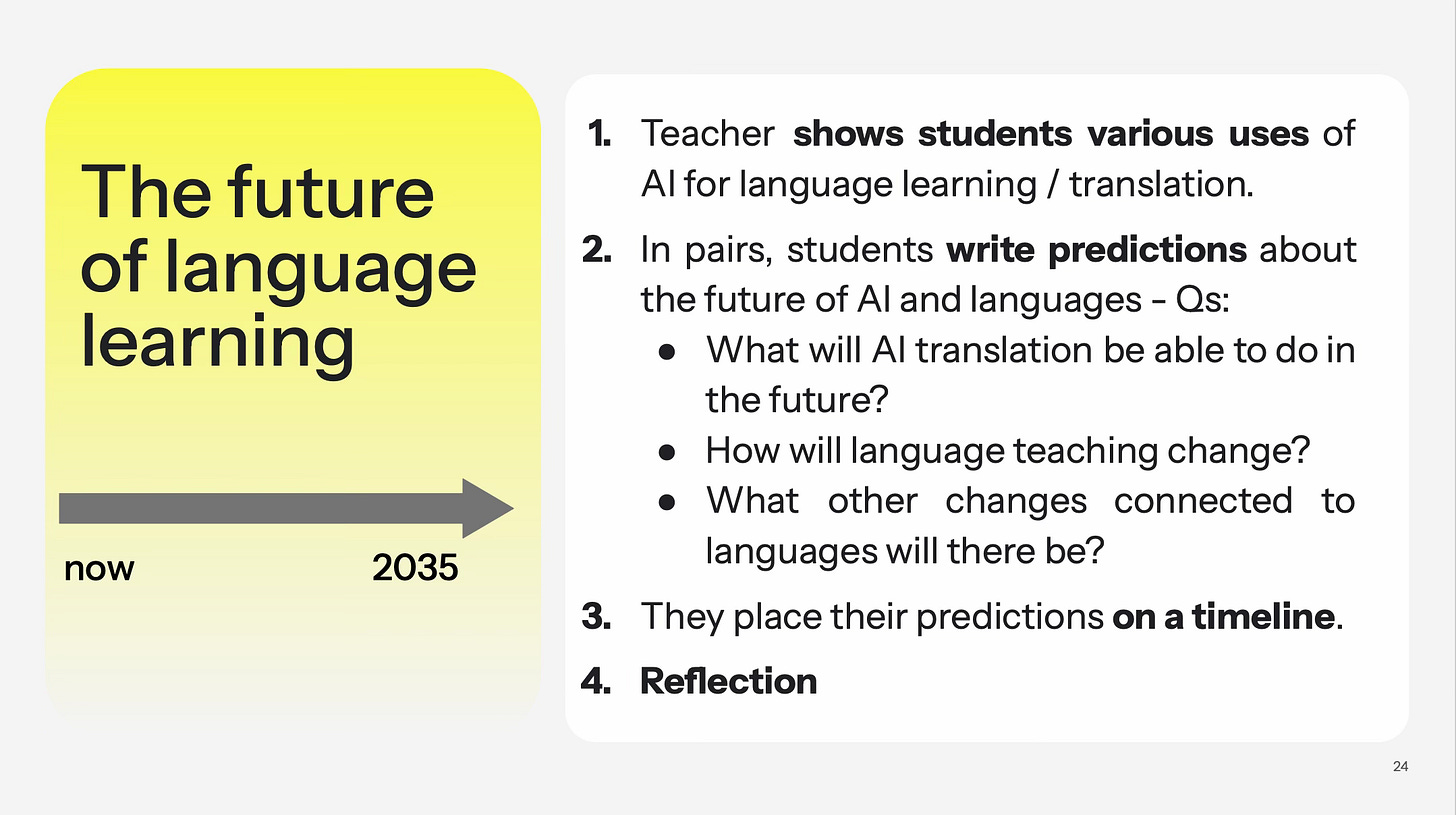[Activity insight] How do teachers feel about AI?
Feelings are completely mixed when teachers are asked about the impact they think GenerativeAI will have on teaching and learning. Let's see why that is and what we can do about these feelings.
British Council (see Edmett et al., 2024) conducted a survey among more than 1300 ELT teachers to find out more about how they are using AI and how they feel about it. The most important finding of this survey is that there is a concerning skills gap (ibid: 11): while almost 80% of teachers use AI tools in their daily work, only 20% say they had enough training in doing so. This basically implies that
they might not be using AI tools safely, ethically, and responsibly
they may not realize what AI’s true impact is going to be on the future of language teaching and learning, and how they should adapt to this new environment.
Zsofi and I had the chance to present to plenary sessions in Vilnius, Lithuania at the “Lithuania and Hungary International Scientific Conference: Challenges and Opportunities of Teaching Less Widely Taught Languages”, where we discussed the questions raised by this survey from two aspects:
why AI literacy plays such a crucial role in language education and why both teachers and students need to become AI literate
why teachers may feel that their teacher identity is threatened by this emerging and disruptive technology, and what they can do to remain indispensable.
Why is AI literacy (instruction) important?
As the British Council report has shown, most teachers are actively using GenAI tools but they haven’t actually been trained to use it well - safely, ethically, and responsibly.
While there are many things we can have GenAI do for us, this doesn’t automatically mean that it should.
AI technologies offer many educational benefits like personalised learning and accessibility, but they also pose risks and challenges like generating inaccurate or biased responses, which can lead to misinformation or unfair treatment. Also, if we rely too much on AI tools, it can negatively affect our writing and thinking skills. Data privacy, copyright issues, and the widening digital divide are further issues to think about.
To address these issues, it’s crucial for everyone to have a basic understanding of AI technologies and their ethical implications. This is called AI literacy.
One of the easiest places where AI literacy instruction can happen is actually the language classroom since teachers there have the freedom to introduce a wide range of topics as long as it’s in the target language. Also, GenAI models are rooted in language, so they are perfect for linguistic activities as well.
What shapes teacher identity and how does AI affect teachers’ futures?
Teacher identity is “a dynamic construct that is shaped by the context in which the teacher works” (Pennington&Richards, 2016: 6). And the context is now hugely different from what it used to be a couple of years ago.
Teachers might feel threatened by the fact that AI can generate, create, plan, adapt, personalize, and differentiate in almost all languages in mere seconds and that may make them unnecessary in the long run. What they worry about the most (based on a very small digital survey of 64 language teachers) is:
how AI is going to affect students’ creative and critical thinking
how they can keep up with all the new tools coming out day by day
how they can detect AI
and how they can help their students use AI safely and responsibly.
But while AI is capable of doing the mechanical or “crafty” bits, the majority of teachers believe (both in the BC survey and in my mini version) that they will never be replaced by AI because of all the things that make us human, like:
emotional intelligence and empathy
humor
intuition
ability to adapt to the target audience
having enough background knowledge about the target audience.
What else do you think makes human teachers indispensable?
What can teachers and students to do to become AI-literate and more prepared for the future?
Have AI use and AI literacy training workshops
Bring AI into the classroom - practice and analyze prompts and generated results
Be transparent about AI use - explain to your students where and why you as a teacher have used it, ask students how they are using it, and discuss together how you all wish AI to be used in class
Offer self- and peer-reflection opportunities, consultation and discussion sessions for staff to look at how others are using AI and to address issues your colleagues may have
Have clear guidelines, terms and conditions, codes of conduct, and legal regulations to address risks and concerns (academic misconduct, data privacy, copyright, use of creative and critical thinking, checking credibility)
Involve students in the curriculum, method, and AI code of conduct development
Activities from our book
We address these questions in a couple of activities in our book:
AI in my future job
This activity encourages students to consider the potential impacts of AI on different professions, both at present and in the future. It also makes them think critically about the human qualities and skills that are difficult for AI to replicate.
The future of language learning
In this activity, students are encouraged to consider how AI may one day shape fields like translation, language teaching, and language-related careers. It also invites students to reflect on why, even in this context, human language skills remain valuable tools.
Keeping up with AI trends - Where is the future taking us?
This activity helps you identify key trends in AI and consider their potential impact on your field, encouraging you to prioritise and prepare effectively. See this connected post for an updated worksheet.



